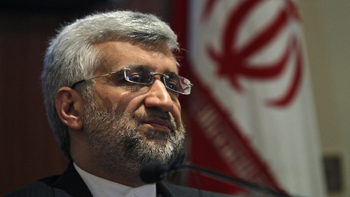
New Delhi, Jan 5: Tehran on Friday sought to allay New Delhi’s concerns over security of the proposed pipeline for bringing natural gas from Iran to India through Pakistan, stating that it was capable of protecting its energy supplies to the countries in the region.
A skeptical New Delhi, however, refrained from committing itself afresh to the ambitious project, but stated that issues like security of the pipeline and pricing of the gas could be discussed during the India-Iran Joint Commission Meeting, which might take place in Tehran in the next few months.
Saeed Jalili, secretary of Iran’s Supreme National Security Council, is understood to have conveyed to External Affairs Minister Salman Khurshid and National Security Advisor Shiv Shankar Menon that Tehran was ready to guarantee security of the pipeline that would run through troubled Balochistan and Sindh provinces of Pakistan.
“Iran not only has the resources to cater to the energy requirements of the countries in the region, but also has the capability of guaranteeing security to its supplies even beyond its border,” Jalili told journalists at the end of his three-day tour to New Delhi. He was replying to a query about India’s apprehensions over the security of the Iran-Pakistan-India (IPI) pipeline.
Jalili cited the example of Iranian Navy’s anti-piracy operations in the international waters in Persian Gulf and Gulf of Oman to drive home the point that the Islamic Republic was capable of guaranteeing not only continuous supply of gas to India through Pakistan, but also security of the pipeline even beyond its borders.
India cited concerns over cost of the gas and security of the pipeline to virtually withdraw from the project over the past couple of years, ostensibly under pressure from the United States, which is keen to isolate Iran and effectively implement sanctions it imposed on the Islamic Republic to dissuade it from making nuclear weapons.
Khurshid on Friday told journalists that India and Iran would discuss the pending issues about the IPI pipeline during the Joint Commission Meeting in Tehran. “Some issues about costs are yet to be sorted out. We will have a joint commission early this year sometime and in that joint commission, this issue will be taken up,” he told journalists after a meeting with Jalili.
India and Iran held the 16th Joint Commission Meeting in New Delhi in 2010. Khurshid was earlier scheduled to travel to Tehran to jointly co-chair the next Joint Commission Meeting with his Iranian counterpart Ali Akbar Salehi in December. The meeting was, however, postponed and New Delhi and Tehran are now working on new dates for the meeting.
New Delhi earlier conveyed to Tehran that it would want Iran to be responsible for the safe passage of the gas through the pipeline’s 1,035-kilometre-long stretch in Pakistan and would pay for the fuel only when it would cross the Pakistan-India border.





Comments
Add new comment